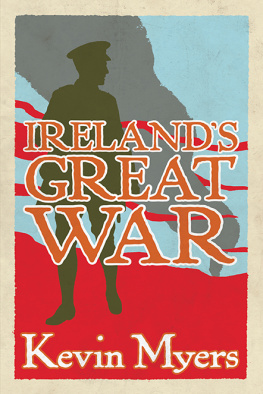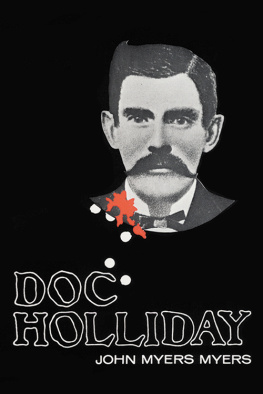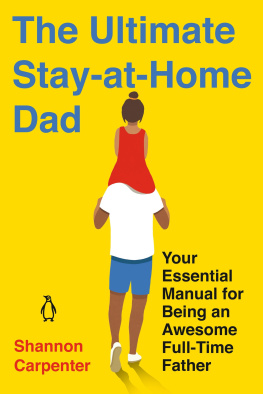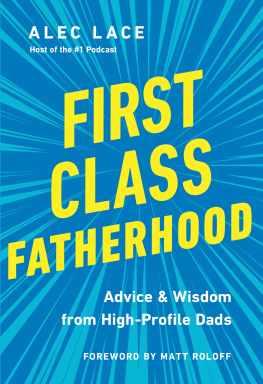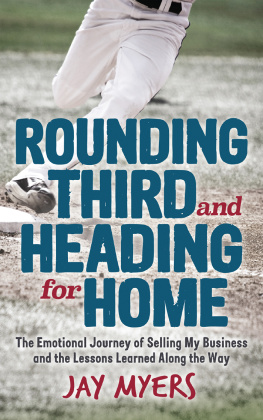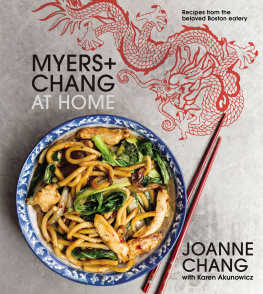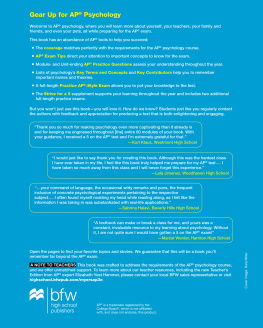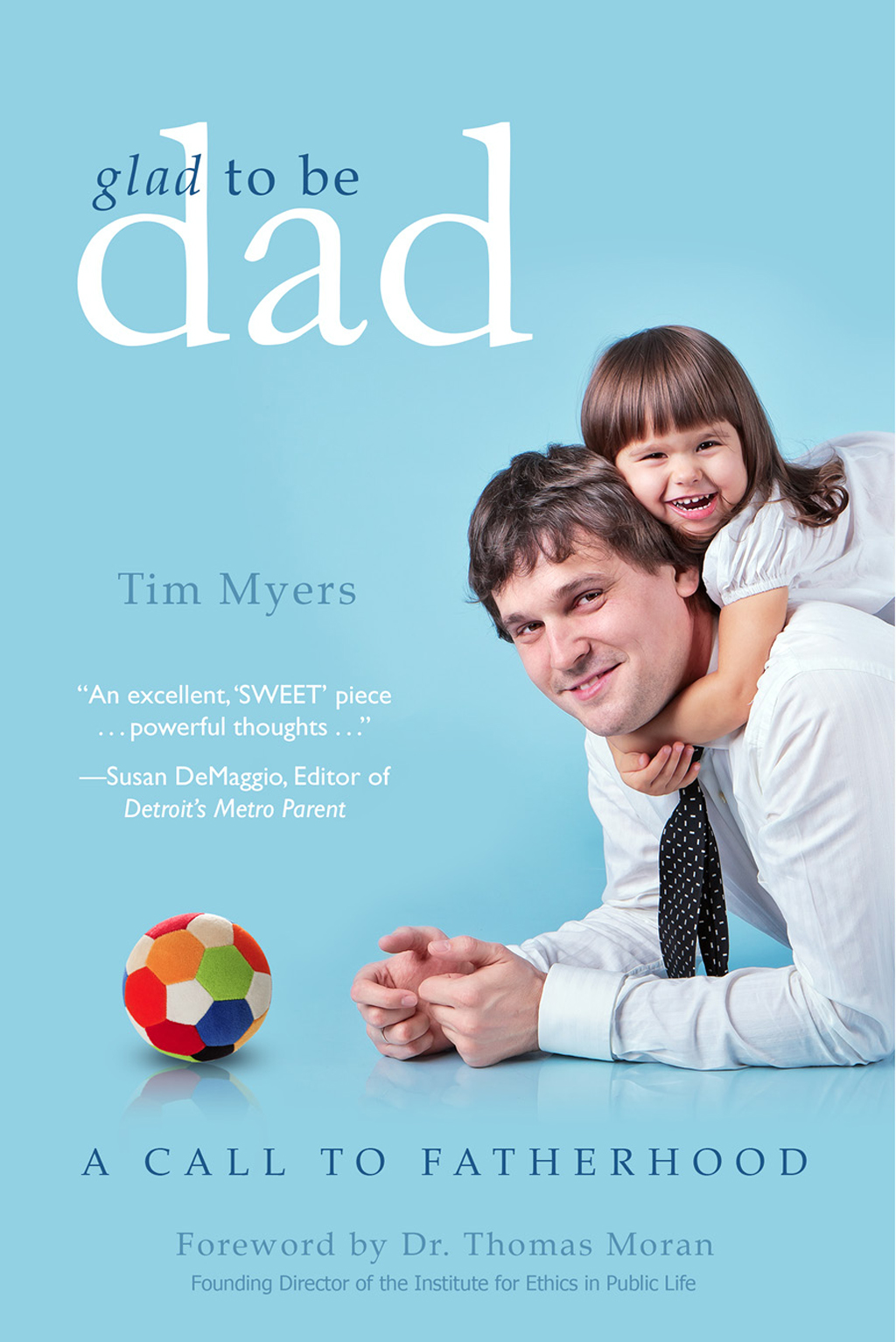glad to be dad
A CALL TO FATHERHOOD
by Tim Myers
A truly rich man is one whose children run into his arms when his hands are empty.
Anonymous
Dedication
What would I give you, child, if I could?
Myrrh and amber and sandalwood;
dolphins painted on Cretan walls
in blues and greens and pale yellows;
a house built deep in a forest of green;
a horse in a stable; a bubble machine;
gold that Inca royals wore;
moonlight through an open door;
toys and books; a dog and a cat;
music that rises; rain in a hat;
the aquamarine of Hawaiian seas
or maybe I should just give
me.
Foreword
I FIRST CAME ACROSS THIS BOOK about 15 years ago, when it was still in an early draft. My wife and I and both our daughters adored it. We found it touching and tender and it prompted many happy and humorous memories of our children's young lives. I've now re-read the book in response to Tim Myers gracious invitation to write a foreword to it. I loved the book the first time I encountered it and I love it now. It is remarkably fresh and relevant.
Let me confess my predisposition to love a book like this. Being a father to my, now grown, daughters has been the greatest joy of my life. That's probably true for most people about parenthood. But in my case it was easy. My daughters are genuinely wonderful. They came into the world that way. I've always said, "Anyone could love these kids." I've met other people's kids with whom I couldn't spend a weekend, let alone a lifetime.
Despite the unalloyed joy I've experienced as a parent, I couldn't escape a rueful sense as I read this book. It reminds me of the things I could have done as a parent and didn't. I have tended to believe that my failings as a parent were mostly failures of omission rather than failures of commission. I have few regrets about any bad behavior on my part but I do regret the things I didn't do that I could have done. The hikes I didn't take, the books I didn't read to them, the math homework I didn't help with, perhaps even not sharing fully and passionately enough with them my love of history, sailing and moonrises.
When I read this book again, it made me wish I had read it and absorbed its wisdom the day my first child was born. Had I done so, I would have worked harder at not missing anything in my childrens growing up. I treasured and still treasure every minute with my children, but now I wonder if I feel that way in part because I didn't spend enough time with them. As Tim points out, with wry humor, all kids have bad moments. That I can remember so few of them with my own children makes me wonder all the more if I shouldn't have been spending more time around the house.
Two vivid memories underscore the point. When my older daughter was about twelve, I called home on a summer afternoon and asked her if she would like to go climb a nearby mountain with me. I had recently finished working on my Ph.D. and now had more free time to do spontaneously exciting things like this with my kids. My daughter was delighted. And when I arrived home a short while later, she was sitting on the front steps waiting for me. She was wearing a pair of black high-top sneakers and shorts that highlighted her long, skinny legs. That afternoon, we hiked to the top of a small mountain in the Adirondacks. I remember thinking to myself that our time together for these special moments was really just beginning. But it wasn't.
The teenage years were about to dawn on our world. There would be precious few days in the future where she would simply be waiting at home for a call from me to go climb a mountain. Soon the house would be filled with other teenagers; too many of them would be boys. Many days she would not be home at allsometimes she would even be out with one of those boys. We still did things together, often simply taking a quiet walk on a summer evening holding hands. But her childhood was ending, even as I thought it was entering the full flower of early summer. Now I know the lesson: There were too many missed summer afternoons. If I had read and really absorbed Tim's book earlier, I would not have had to learn that lesson the hard way.
I learned a second lesson about parenting, this time in a more timely manner, but also quite accidentally. When my younger daughter was about two years old she caught a bad cold. Every night that winter at about two o'clock in the morning, she would wake up and need hot tea to relieve her congestion. Since I was still working on my dissertation at this point and staying up late anyway, I would just wait for her to awaken and sit with her in the quiet of the dimly lit kitchen of our graduate school apartment. She would sit in silence and look at me with her big, soulful, trusting brown eyes, while I spoon-fed her the hot tea. This went on every night for about two weeks. I have never gotten over the realization of the bonds of tenderness that grow between a parent and a vulnerable and grateful child in the middle of the night.
Because of the path he chose, Tim's life must have been filled with many more of these moments than mine has been. But even in my case, the outcome was powerful. For the rest of her childhood, when my daughter felt sick at night, she would come and get me. I imagine there were nights when I really didn't want to get up, but as I look across my life now, I know that she gave me a great gift. Those were precious moments and I continue to relive them as precious memories.
Tim Myers book not only brings me closer to my children it brings me closer to my wife as well. His depictions of the workload and demands of running a household and being a loving parent, often while working outside the home, leave me with awed admiration for the women who have always managed these roles, including my own wife, who performs them so superbly well. Too often women do all of this with little awareness of their extraordinary accomplishments on the part of the men who live with them and perhaps, more sadly, with even less open expression of gratitude and respect from those men.
Reading this book is a blunt reminder to me of how much more help I could have been and still could be to my wife in the shared responsibilities of living together. At a purely practical level, the book makes me think I should learn to cook well enough so that my wife would want to eat what I prepare. (I'll eat pretty much anything, which means that her gourmet cooking is largely wasted on me; friends eat at our home and wonder why I don't weigh 300 pounds.) Given my orientation to food, I may never be the family cook. But Tim writes a lot about vacuuming. Surely I could do more of that going forward. Thanks, Tim, seriously.
If you are a man, read this book and learn. If you are a woman, read this book and encourage the man in your life to learn from its insights; doing so will enrich both of your lives.
Frequently, I wonder if there is a view of family life that doesn't have the barbed and edgy humor of a TV sitcom, like Everybody Loves Raymond . Programs of this sort remind me of Eugene ONeills play, Long Days Journey Into Night. Or perhaps even more fundamentally, a Greek tragedy moved to the American suburbs, with good comedic gag lines instead of bellowing. But the gags and barbed humor still wound and diminish. We laugh while the bonds of family life get reduced to the accretions of resentments, rivalries and needs for dominance and subterranean psychological control.
Of course, we human beings are complex and nothing perhaps is ever precisely what it appears to be. The dynamics of love and family are multilayered and contradictory. Yes, I get that. But sometimes I long for a narrative in which children's problems become opportunities for new ways for parents to create the conditions in which love grows. Tim Myers book does just that. His book is not simpleminded; in fact, it is sophisticated, albeit in a disarming and lighthearted way. Nevertheless, the book answers that longing and strives to light a path to the most hopeful human capabilities.



